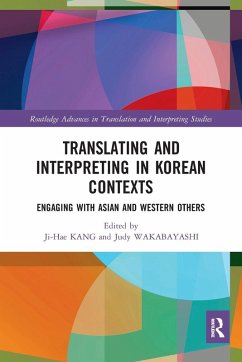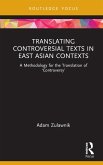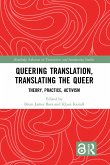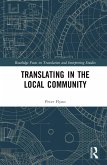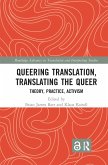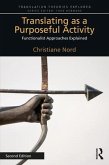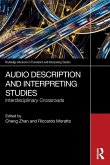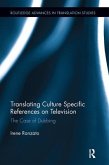The focus of this volume is on how the people of the Korean Peninsula-historically an important part of the Sinocentric world in East Asia and today a vital economic and strategic site-have negotiated oral and written interactions with their Asian neighbors and Europeans in the past and present through the mediation of translators and interpreters.
These encounters have been shaped by political, social, and cultural factors, including the shared use of the Chinese writing system in East Asia for many centuries, attitudes toward other Asians and Westerners, and perceptions of Korean identity in relation to these Others. After exploring aspects of historical interactions, the volume addresses how the role and practice of translation and interpreting have recently evolved as a result of the development of digital technology, an increase in the number of immigrants, and changes in political and cultural dynamics in the region. It covers a range of historical and contemporary aspects, genres, and venues that extend beyond the common yet restrictive focus on literary translation and includes discussions of translator training and academic studies of translation and interpreting in Korea.
Hinweis: Dieser Artikel kann nur an eine deutsche Lieferadresse ausgeliefert werden.
These encounters have been shaped by political, social, and cultural factors, including the shared use of the Chinese writing system in East Asia for many centuries, attitudes toward other Asians and Westerners, and perceptions of Korean identity in relation to these Others. After exploring aspects of historical interactions, the volume addresses how the role and practice of translation and interpreting have recently evolved as a result of the development of digital technology, an increase in the number of immigrants, and changes in political and cultural dynamics in the region. It covers a range of historical and contemporary aspects, genres, and venues that extend beyond the common yet restrictive focus on literary translation and includes discussions of translator training and academic studies of translation and interpreting in Korea.
Hinweis: Dieser Artikel kann nur an eine deutsche Lieferadresse ausgeliefert werden.
'Bold in design and extensive in coverage, this exciting volume of studies on Korean translation, both historical and contemporary, presents in English an array of updated research on a little-explored field. Individual contributors reconceptualize premodern translation (or quasi-translation) practices in Korea, introduce readers to the current scene through hitherto unexamined case-studies, and initiate challenging research questions for future investigation. The editors have done a marvelous job of supplying a missing piece in the puzzle of East Asian translation and illustrating the possibility of bringing Western theory to bear on non-Euro-American traditions.' - Professor Leo Tak-hung Chan, Department of Translation, Lingnan University
'This book showcases the variety of interests of the translation and interpreting studies research community in East Asia, with a particular focus on Korea. By gathering a handful of seasoned as well as younger researchers, the editors have successfully managed to provide a vibrant picture of the crucial role of translation in the region as authors, explored issues such as the concept of transediting in the dissemination of knowledge via non-profit NewsPro, the importance of translation in the creation of new literary forms in North Korea, the role of translation in the promotion of Western-style democracy in South Korea, and the significance of the retranslations of a classic such as Self-Help in the quest for the independence of Korea among many other fascinating topics. Additionally, the contributions to this edited collection convincingly interact with published research in the West, which, in turn, will benefit from the range of topics herewith discussed.' - Roberto A. Valdeón, Professor in English Studies, University of Oviedo, Spain
'This is a landmark collection. It provides, for the first time in English, a comprehensive picture of translation and interpreting in the Korean peninsula. And what a rich tapestry it is! It combines historical depth with contemporary relevance, covers online and activist communities as well as Cold War propaganda and missionary translation, and concludes with disciplinary surveys of both translation and interpreting studies. The book adds significantly to the international understanding of translation in Asia.' - Theo Hermans, Emeritus Professor, Centre for Translation Studies, University College London
'This book showcases the variety of interests of the translation and interpreting studies research community in East Asia, with a particular focus on Korea. By gathering a handful of seasoned as well as younger researchers, the editors have successfully managed to provide a vibrant picture of the crucial role of translation in the region as authors, explored issues such as the concept of transediting in the dissemination of knowledge via non-profit NewsPro, the importance of translation in the creation of new literary forms in North Korea, the role of translation in the promotion of Western-style democracy in South Korea, and the significance of the retranslations of a classic such as Self-Help in the quest for the independence of Korea among many other fascinating topics. Additionally, the contributions to this edited collection convincingly interact with published research in the West, which, in turn, will benefit from the range of topics herewith discussed.' - Roberto A. Valdeón, Professor in English Studies, University of Oviedo, Spain
'This is a landmark collection. It provides, for the first time in English, a comprehensive picture of translation and interpreting in the Korean peninsula. And what a rich tapestry it is! It combines historical depth with contemporary relevance, covers online and activist communities as well as Cold War propaganda and missionary translation, and concludes with disciplinary surveys of both translation and interpreting studies. The book adds significantly to the international understanding of translation in Asia.' - Theo Hermans, Emeritus Professor, Centre for Translation Studies, University College London

